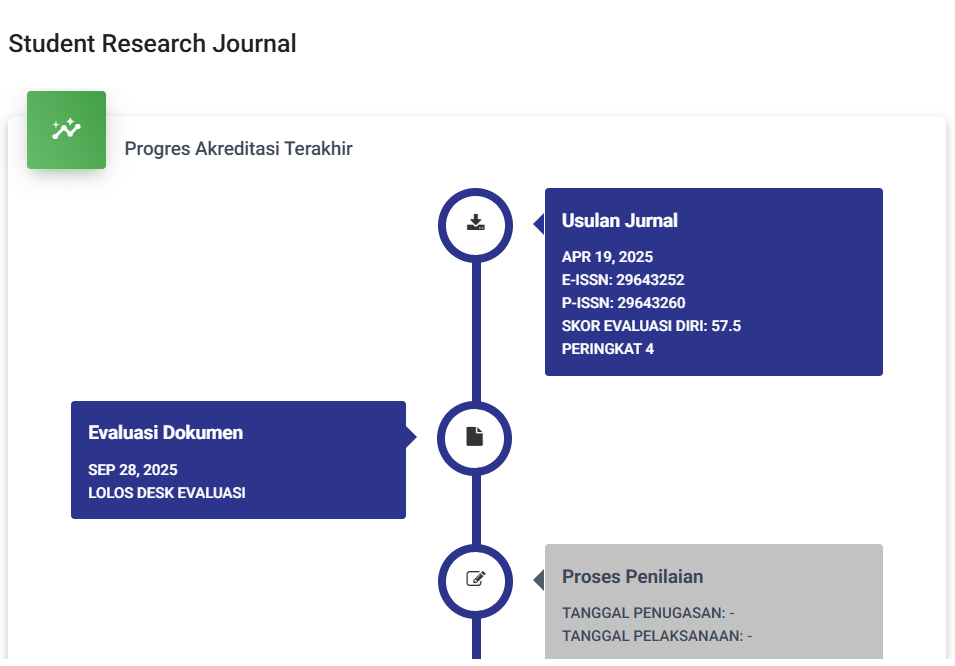Analisis SWOT Kegagalan Tim Nasional Sepak Bola Indonesia U-17 Dalam Piala Dunia U-17 Tahun 2023
DOI:
https://doi.org/10.55606/srjyappi.v2i4.1347Keywords:
SWOT Analysis, Indonesian National Team, Football, 2023 U-17 World CupAbstract
Football is a sport played by two opposing teams. The objective of football is to score goals against the opponent's goal to win the match. SWOT analysis, which includes strengths, weaknesses, opportunities, and threats, is used to identify the factors contributing to the failure of the Indonesian national under-17 football team in the 2023 FIFA U-17 World Cup. This study adopts a qualitative research approach with a descriptive method. The aim of this research is to describe the events that occurred during the unsuccessful matches of the Indonesian national under-17 football team in the 2023 FIFA U-17 World Cup. These events are available for viewing through match video recordings. Data sources for the research were collected through various methods, including direct interviews with licensed football coaches, analysis of video recordings of the Indonesian national under-17 football team matches, review of coach interview recordings from sources such as YouTube, and study of related articles from internet sports media. Data collection methods involved observation, interview interaction, and documentation. The research findings are as follows: (1) Strengths: The Indonesian under-17 national team has good quality in technical factors and skills, but not all players possess good playing techniques, and the advantage of an experienced coach is able to utilize the strengths of the players. (2) Weaknesses: Experiencing a decline in physical condition towards the end of matches causing a decrease in player concentration resulting in decision-making errors and experiencing decreased concentration leading to panic in ball control and often unnecessary fouls. (3) Opportunities: Indonesia hosting the 2023 FIFA U-17 World Cup with the support of supporters filling the stadium in every match. However, if players are not accustomed to the presence of many supporters in the stadium, this could backfire and affect the players' mental state. (4) Threats: Lack of knowledge about the potential opponents, presence of several teams with higher rankings, and potential disruptions caused by social media to the mental condition and concentration of the players.
References
Amemiya, R., & Sakairi, Y. (2019). The effects of passion and mindfulness on the intrinsic motivation of Japanese athletes. Personality and Individual Differences, 142(December 2018), 132–138. https://doi.org/10.1016/j.paid.2019.01.006
Bangun, S. Y. (2019). Peran Pelatih Olahraga Ekstrakurikuler Dalam Mengembangkan Bakat Dan Minat Olahraga Pada Peserta Didik. Jurnal Prestasi, 2(4), 29.
Bahtra, R. (2022). Buku Ajar Permainan Sepakbola (Issue 156).
Erianto, D. (2023, November 6). Piala Dunia U-17 FIFA: Sejarah, Sistem Kompetisi, Peserta, Tuan Rumah, dan Tim Juara. Retrieved January 24, 2024, from kompaspedia.kompas.id.
Erfayliana, Y., & Wati, O. K. (2021). Tingkat Keterampilan Dasar Bermain Sepakbola Peserta Didik Kelas Atas Sekolah Dasar. TERAMPIL: Jurnal Pendidikan Dan Pembelajaran Dasar, 7(2), 159–166.
Nugraha, M. D., & Kusuma, D. W. Y. (2021). Analisis Cyberbullying di Sosial Media pada Atlet Pelatnas Bulutangkis (Studi Kasus pada Akun Instagram Atlet Pelatnas). Indonesian Journal for Physical Education and Sport, 2(1), 311–319.
Pamungkas, A. (2016). Hubungan antara tingkat konsentrasi terhadap keterampilan bermain sepakbola pada siswa peserta ekstrakurikuler sepakbola SMP N 1 NGAGLIK. 1–6.
Qohhar, W., & Pazriansyah, D. (2019). Pengaruh Model Pembelajaran Kooperatif Tipe Teaching Games For Understanding (TGFU) Terhadap Peningkatan Hasil Belajar Teknik Dasar Sepakbola. Physical Activity Journal, 1(1), 27.
Rojali, A. P., Syafei, M. M., & Nugroho, S. (2021). Pemahaman Siswa terhadap Pembelajaran Permainan Sepakbola di Sekolah Menengah Atas pada Masa Pandemi Covid-19. Gelanggang Olahraga: Jurnal Pendidikan Jasmani Dan Olahraga (JPJO), 5(1), 118–126.
Sani, K., Akhiruyanto, A., & Kusuma, D. W. Y. (2020). Hubungan Kehadiran Orang Tua dan Suporter di Arena Bertanding Terhadap Tingkat Motivasi Atlet Pelajar dalam Bertanding Sepak Bola Usia 12-15 Tahun Kabupaten Pemalang. Indonesian Journal for Physical Education and Sport, 1(1), 188–196.
Sucipto. (2023). Mahir Bermain Sepak Bola. Bandung: INDONESIA EMAS GROUP.
Wicaksana, A. (2016). Peran Kondisi Fisik dalam Sepakbola. Jurnal Pendidikan Kesehatan Rekreasi, 7(1), 186–192. https://medium.com/@arifwicaksanaa/pengertian-use-case-a7e576e1b6bf
Wiswasta, I. G. N. A., Agung, I. A. A., & Tamba, I. M. (2018). Analisis SWOT (Kajian Perencanaan Model, Strategi, dan Pengembangan Usaha).
Downloads
Published
How to Cite
Issue
Section
License
Copyright (c) 2024 Bayu Setyawan, Mokhamad Nur Bawono

This work is licensed under a Creative Commons Attribution-ShareAlike 4.0 International License.








